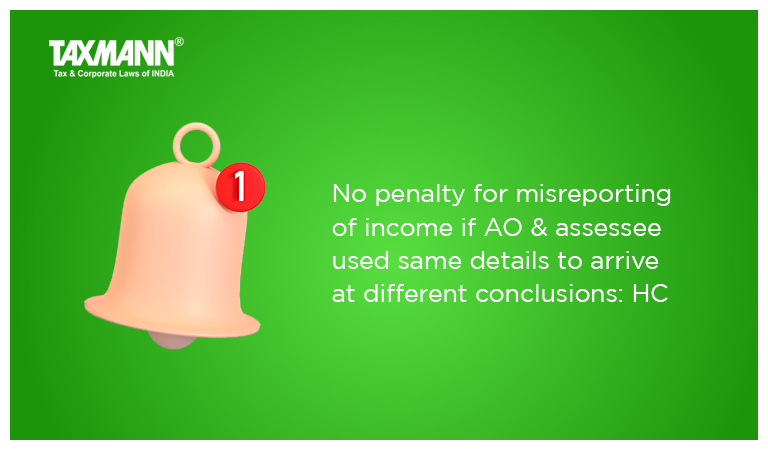No penalty for misreporting of income if AO & assessee used same details to arrive at different conclusions: HC
- Blog|News|Income Tax|
- 2 Min Read
- By Taxmann
- |
- Last Updated on 14 September, 2022

Case Details: Prem Brothers Infrastructure LLP v. National Faceless Assessment Centre - [2022] 142 taxmann.com 38 (Delhi)
Judiciary and Counsel Details
-
- Manmohan & Ms Manmeet Pritam Singh Arora, JJ.
- Ved Kumar Jain, Adv. for the Petitioner.
- Sanjay Kumar, Adv. for the Respondent.
Facts of the Case
The instant writ petition was filed by the assessee against the order imposing penalty under section 270A alleging misreporting of income. The assessee challenged the impugned order and also sought a direction to revenue to grant immunity under section 270AA.
High Court Held
The Delhi High Court held that the only addition in the assessment order framed by Assessing Officer was in respect of disallowance under section 14A. The assessee made a disallowance of Rs. 3,20,14,010/- which was recomputed by the AO at Rs. 6,82,45,759/-. Thus, this is a case where the amount of underreporting of income is consequent of an increase in the disallowance voluntarily estimated by the assessee.
High Court held that there can be cases where underreporting of income may result in misreporting of income, however, in peculiar facts of the present case, the underreporting allegedly done by the assessee cannot amount to misreporting as the assessee had furnished all the details of the transactions relating to disallowance made under section 14A.
AO as well as the assessee had used the same details to arrive at different conclusions i.e. differing quantum of disallowances under section 14A. This by no stretch of the imagination can be held to be ‘misreporting’.
Further, there was not even a whisper as to which limb of section 270A is attracted and how the ingredient of sub-section (9) of section 270A is satisfied. In the absence of such particulars, the mere reference to the word “misreporting” by AO in the penalty order to deny immunity from imposition of penalty and prosecution makes the impugned order manifestly arbitrary.
List of Cases Referred to
-
- Joint Investments (P.) Ltd. v. CIT [2015] 59 taxmann.com 295/233 Taxman 117/372 ITR 694 (Delhi) (para 4)
- Schneider Electric South East Asia (HQ) PTE Ltd. v. Asstt. CIT, International Taxation [W.P. (c) No. 5111 of 2022, dated 28-3-2022] (para 6).
Disclaimer: The content/information published on the website is only for general information of the user and shall not be construed as legal advice. While the Taxmann has exercised reasonable efforts to ensure the veracity of information/content published, Taxmann shall be under no liability in any manner whatsoever for incorrect information, if any.

Taxmann Publications has a dedicated in-house Research & Editorial Team. This team consists of a team of Chartered Accountants, Company Secretaries, and Lawyers. This team works under the guidance and supervision of editor-in-chief Mr Rakesh Bhargava.
The Research and Editorial Team is responsible for developing reliable and accurate content for the readers. The team follows the six-sigma approach to achieve the benchmark of zero error in its publications and research platforms. The team ensures that the following publication guidelines are thoroughly followed while developing the content:
- The statutory material is obtained only from the authorized and reliable sources
- All the latest developments in the judicial and legislative fields are covered
- Prepare the analytical write-ups on current, controversial, and important issues to help the readers to understand the concept and its implications
- Every content published by Taxmann is complete, accurate and lucid
- All evidence-based statements are supported with proper reference to Section, Circular No., Notification No. or citations
- The golden rules of grammar, style and consistency are thoroughly followed
- Font and size that’s easy to read and remain consistent across all imprint and digital publications are applied



 CA | CS | CMA
CA | CS | CMA
